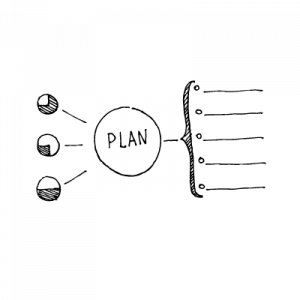You could spend hours Googling the perfect answers to those tricky MBA interview questions.
But you might be better off sticking with your own, more genuine answer.
Here we cover some of the most common MBA admissions interview questions, with admissions interviewers offering their advice on how best to answer them and get the most out of your interview.
Tell me a bit about yourself
You’ve only just sat down in the interview room, and they hit you with this incredibly broad, devastatingly all-encompassing request.
It’s the stuff of MBA applicant nightmares. But do interviewers even use this question?
“We don’t usually use such an open-ended question,” says Erin Town, MBA Admissions Director at the University of Washington’s Foster School of Business.
“But we might ask something along the lines of, ‘tell me a little bit about how you got to where you are today, in terms of your work experience’, or ‘walk me through your résumé.’”
“I think in most cases interviewers – and this is the case for us – are looking for a quick summary.
Town continues: some “candidates fall into the trap of walking through every single detail of their résumé and how they got to where they are now, and we’re looking a bit more for the big picture of it.”
Town says interviewers tend to have the résumé already in front of them. “So it’s more about how they tell their story, not so much about the little details.”
Marcel Kalis, who serves as a member of the admissions committee at the European School of Management and Technology (ESMT) in Berlin as Head of Career Services, agrees.
“I had an interview this morning and I asked this as the first question, but it’s more about the structure of how people respond.”
Kalis says that ESMT’s relatively small cohort sizes – typically 60-70 students – mean that everyone is expected to contribute, “so we want to see that their communication skills are good enough to participate in this activity”.
Nicole Tee, Director of Graduate Studies at Nanyang Business School in Singapore says that their admissions interviewers are unlikely to use such a broad question, but that “every candidate will get a different set of questions depending on what area of their profile we want to go into”.
Still, she says it’s all about assessing how an applicant communicates.
“We’re looking at their communication skills, whether they’re able to communicate with passion and conviction, whether they’re able to express their ideas clearly, whether they’re focused and really know why they want to do an MBA at this point in their lives.”
She says, “by hearing their responses, you hear whether this person has clarity of thought in terms of their goals”.
What are your strengths and weaknesses?
Erin Town at Foster School of Business says that their admissions team uses anecdotal questions to gauge applicants’ ability to face challenges.
“We’re really assessing candidates’ abilities to accept and learn from feedback, to seek other opportunities to prove themselves, their self-awareness, their ability to work with others and thrive in that environment.”
“Those questions are a lot of the types of ‘tell me about a time when…’ questions, so ‘tell me about a time when you had to ask for help’, or ‘tell me about a time when a project you were working on wasn’t going in the right direction and you had to start over’.”
Town says they may also ask about a compliment or criticism the applicant has received.
“I find that candidates have a much easier time coming up with a criticism that they’ve received, and then the compliment is harder,” she says. “We want candidates to be really self-reflective and self-aware and humble, but at the same time we want to see that they’re proud of their achievements and that they’re aware of their strengths too.”
Marcel Kalis at ESMT says that he might ask, ‘what do you think will be your greatest challenge?’
But, he says he’s not so in favour of these questions because applicants can prepare by looking up strategic answers online, rather than giving their own, more genuine answers.
He and Nanyang’s Nicole Tee both say they sometimes use questions about strengths and weaknesses when they want to assess a personality trait, such as dominance, cultural awareness or tenacity, and how that might impact on an applicant’s ability to interact with their classmates.
Why an MBA, and why now?
Foster School of Business’s Erin Town says, “we tend to ask what they want to do next in their career. And we assume that we’ll obviously get to, ‘why do you need an MBA to do that?’”
But what we’re wanting to see is that they’ve thought about their short and long-term goals, and that the MBA is not the goal itself.”
“We don’t expect our candidates to know exactly what they want to do when they graduate, but we want to see that they’ve put some thought into it and they’ve done some research. So we tend to ask them a lot of questions actually about their plans.”
Why are you interested in this school or program specifically?
This question is an opportunity for you to show how well you have prepared, according to Kalis at ESMT.
“We would like to encourage people to prepare in a way so that they’ve talked with current students, that they’ve talked with alumni, that they’ve absorbed the information we publish on our website.”
Town at the Foster School of Business says, “I might ask them, ‘what were the top three qualities you were seeking in an MBA program?’ to try and understand how we ended up at the top of their list. I think people who’ve done their research have no problem thinking about ‘well this is what I’m looking for in an MBA, and this is what I see in your school’.”
She says applicants show they’re willing to go the extra mile if they can be specific about how they plan to spend their time on the program. “Maybe there are specific companies they want to connect with, or there are projects or opportunities that we offer.”
While an interviewer might not ask about your expectations of the program directly, admissions teams are looking to ensure that what you expect to get out of a school and MBA program matches up with what they have to offer.
Town says, “we try to understand what gaps they’re seeing in their own experience or abilities that’s preventing them from [achieving their goals] now, and then we eventually get to ‘how is the MBA going to help you fill in those gaps?’.”
Kalis at ESMT says he’s also interested to know what an applicant expects to do after their MBA. He says that understanding what a student expects to get out of their program is important. “They invest a lot of time and money in their MBA, can we deliver what they expect?”
Think about what you have to offer
The need to meet expectations runs both ways. Schools also want to know how you can add value to their program.
“I think one of the things we ask that sometimes surprises people is, ‘what are your interests, what are your hobbies, what do you do outside of work?’,” says Tee at Nanyang Business School
“I think this sometimes takes people by surprise and they might wonder, ‘why does that matter?’ But we’re looking for well-rounded people who are not only focused on work or studies. We want interesting people with interesting backgrounds and experiences which they can bring in to enrich the experiences of their fellow MBA classmates.”
Showing a willingness to give of yourself can be key.
“I think it’s nice when applicants prepare something on how they can contribute to the school and what other people can learn from them,” says Kalis at ESMT. “What are they bringing that other people can profit from?”
And he says that doesn’t end once you’ve got your certificate in hand. ESMT is looking to turn out alumni who can serve as ambassadors for the school.
“That’s another factor: are students willing to give back after their MBA?”
Finally, do you have any questions?
Kalis says he always asks this question at the end, and that interviewees tend to use the time to ask for more specific details about the academic program, or about support they may require, such as with housing or scholarships.
This is the time to make sure that any questions or doubts you might have about undertaking the program have been covered.
But it’s also a delicate dance between making sure you know everything you need to, showing a genuine interest in the program, and being prepared enough so that you won’t ask anything embarrassing that might reveal a lack of research.
Kalis’s advice is to, “try to avoid the common questions. If it starts with, ‘oh, is your program one year long?’ Then I would think that the person is not suitable to come to us.”
Town advises that applicants “remember [the interviewers] are probably pretty busy, so maybe keep it to 2-3 questions and check in with the interviewer that there’s enough time for your questions”.
“My advice is to ask questions that you’re legitimately interested in. I think sometimes people go online and find ‘what’s the question I should ask at the end of an MBA interview’.”
In the end, this is an opportunity to show a deeper interest.
“From the questions that they ask, you can tell how much they know about the program,” says Tee at Nanyang Business School.
“Most of them, by the time they get to the interview, they will know all the things they need to know about the program, because they will have spoken to the admissions team, they will have gone through the website and the brochures and some of them will already have visited,” she says.
“So you can tell if they’ve already done their research or if they only know the program very superficially.”
Image: Interviews auf dem Campus der Universität St.Gallen by HSGTalents CC BY 2.0 (cropped)










